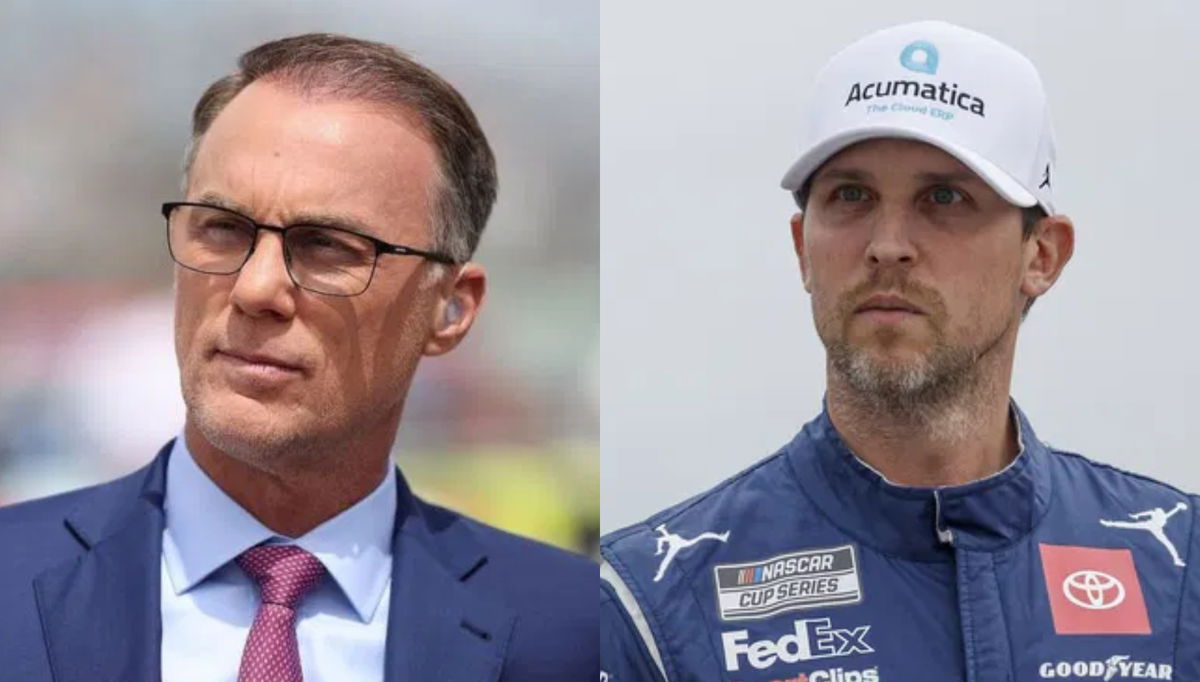
Imago
via Imago

Imago
via Imago

Imago
via Imago

Imago
via Imago
Before Denny Hamlin became one of NASCAR’s biggest names, his story started in a garage with his dad, Dennis Hamlin, turning the wrenches. Dennis wasn’t just a proud parent cheering from the stands. In fact, he was the earliest crew chief, the guy who mortgaged the family home (twice) and even sold his beloved 1932 Ford hot rod to keep Denny’s racing dream alive. That kind of sacrifice doesn’t just buy speed; it builds character. Denny has often credited his relentless drive to lessons learned from his dad, like “you don’t leave until the last customer’s gone.”
Watch What’s Trending Now!
Even today, Dennis’s opinion carries weight, whether it’s advice about racing or asking his son to retire a catchphrase he disliked. That bond has always been central to Denny’s journey. Which is why, as Denny pushes through the intensity of the playoffs, balancing family health concerns has become just as heavy as the championship fight itself.
Kevin Harvick explains the reason behind Hamlin’s anger
Denny Hamlin was on the verge of earning his 60th NASCAR Cup Series win at Kansas, dominating with 159 laps led and sweeping the stages. Everything changed in overtime when Hamlin and Bubba Wallace battled for victory. As the two Toyotas entered Turn 3, Hamlin’s inside move caused contact with Wallace, sending him into the wall and letting Chase Elliott surge past for the win. Hamlin’s heartbreak was palpable, having come so close to a milestone moment.
Hamlin’s mentality has been fierce all season. As Mamba Smith recalled, “When he said, either get on the bandwagon or get run over by his wagon. He was 1,000% serious.” The seriousness has increased due to stress, especially given personal concerns about his father’s declining health.
Hamlin has referenced it several times in recent interviews, sharing stories of family moments that underscore how deeply he values his father’s support and approval. Remember how he asked for forgiveness from his father after his win at WWT Raceway, after his father had asked him to stop poking the attendees and viewers?

Imago
Syndication: Daytona Beach News-Journal Denny Hamlin answers questions from the media during Media Day at Daytona International Speedway, Wednesday, Feb. 14, 2024. , EDITORIAL USE ONLY PUBLICATIONxINxGERxSUIxAUTxONLY Copyright: xNADIAxZOMORODIAN/NEWS-JOURNALx USATSI_22554099
A complicating factor was Hamlin’s forced pit crew changes in Kansas stemming from a NASCAR penalty at Bristol. “They had obviously forfeited to have the crew with them last week,” Kaitlyn noted. Two crucial crew members were suspended due to a wheel loss, and their replacements (though competent) made uncharacteristic mistakes.
Kevin Harvick summarized, “They did. And ultimately it cost them the lead, and that’s the fear that you have, right?” The shuffled crew’s errors placed Hamlin in a vulnerable spot during critical playoff moments. The depth of Hamlin’s frustration, intensified by family health and playoff pressure, was clear to those around him.
In these moments, sympathy from fellow competitors and insiders like Kevin Harvick has grown. They see the human side of Hamlin. For Hamlin, every race now carries extra meaning, not just for his career legacy, but for the family he strives to make proud.
Denny Hamlin isn’t the owner of 23XI Racing on Sundays
Denny Hamlin’s dual role as a driver for Joe Gibbs Racing and co-owner of 23XI Racing with Michael Jordan is a unique fixture in NASCAR, but Hamlin draws a distinct line between the two hats when he straps into his No. 11 Toyota on race day. As Sunday’s Kansas duel illustrated, on Sundays, Denny Hamlin is the driver of the Joe Gibbs Racing No. 11 and not the co-owner of 23XI Racing. Hamlin owes nothing on the track to Bubba Wallace and Tyler Reddick on the final lap.
That reality confounded many after Hamlin’s aggressive racing with Wallace, a 23XI driver, in Kansas cost the team crucial playoff points. Nevertheless, Hamlin was unwavering: “Because I’m racing for the win,” he explained. “And I definitely won’t apologize for racing for the win.”
The expectation that Hamlin should somehow prioritize his own team’s success over his own competitive drive is, to him, fundamentally misguided. “On Sunday, I’m the driver of the No. 11 car and not the owner of the 23 car. That’s where the disconnect comes from. People expect me to be a different person.”
This boundary has precedent. NASCAR’s competitive ethos revolves around individual achievement, even among multi-car teams. Hamlin has detailed that he “will always prioritize me winning first,” but maintains he would never compromise another driver’s chance at victory intentionally. However, in split-second, high-stakes moments, like the Kansas overtime, owner-driver dynamics fade. It is replaced by raw racing instinct and the chase for a personal legacy.
Hamlin’s approach is a clear message to the garage and fans. On Sundays, business interests and team politics give way to the on-track battle, where every win (especially milestone victories) takes precedence. That’s the driver’s code, even when team allegiances complicate the optics.


